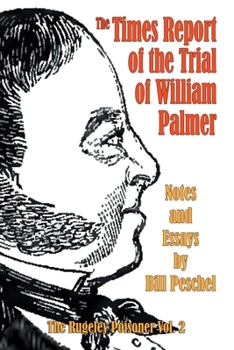The Times Report of the Trial of William Palmer
IT IS THE YEAR 1856. Queen Victoria has ruled for 19 years. The Crimean War recently ended after three years of bloody fighting. The elimination of taxes on newspapers unleashed a demand for stories and the bloodier the better.
The arrest of Dr. William Palmer of Rugeley for murder gave the public what it wanted: a terrifying death by strychnine; a glimpse into the shady world of horse-racing; and the possibility of insurance fraud. And the horrible suspicion that the soft-spoken, placid Palmer had also killed his wife, mother-in-law, brother, and most of his children.
The sensational 12-day trial in London's Old Bailey drew the attention of royalty (Prince Albert bought one of Palmer's horses) and inspired Charles Dickens and Wilkie Collins. Doctors clashed on the stand as expert witnesses and spoke out in public. The public took it all in and heatedly debated the question: Did the good doctor poison his friend under the guise of curing him?
Originally published in 1856, this edition of "The Times Report of the Trial of William Palmer" reprints the court transcript, edited and corrected for the first time, along with more than 60 woodcuts restored to make them look better than the day they were printed. This edition also includes more than 250 footnotes explaining historical, legal, and medical references; period maps of England and the Staffordshire region; a glossary of medical and scientific terms; and profiles of the leading legal figures in the case. The result is a fresh look at the mass-murdering country doctor and the trial that shocked Britain.
The Rugeley Poisoner series also includes "The Illustrated Life and Career of William Palmer" (1856) and "The Life and Career of Dr. William Palmer of Rugeley" (1926).





